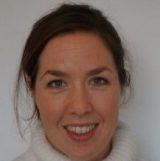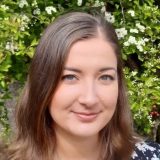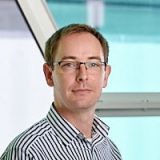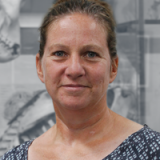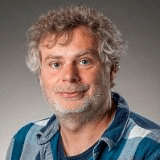Gabriel researches the effects of environmental change on the structure and functioning of ecosystems (which comprise groups of species, their interactions with one another and with the physical and chemical environment in which they exist). His work spans multiple levels of biological organisation, from sub-cellular biochemistry to the dynamics of ecosystems, and searches for similarities across aquatic and terrestrial systems. The ultimate goal of his work is to develop a predictive ‘tool box’ to forecast how ecosystems will change in a world increasingly dominated by humans and the oceans.
Michiel vos
Michiel combines approaches from microbiology, evolutionary ecology and population genomics to study bacterial evolution, focusing on horizontal gene transfer, sociomicrobiology and pathogens in the environment. Key projects include exploring the ecological drivers of antimicrobial resistance and virulence in aquatic bacteria.
Rod Wilson
Rod is a comparative physiologist. He aims to provide a more holistic understanding of homeostasis in aquatic animals, both fish and invertebrates, freshwater and marine. This includes studies of how anthropogenic and natural environmental changes impact upon physiology and behaviour in the wild, and how to use physiology to help improve the sustainability of aquaculture (including animal growth efficiency and health, pathogen/parasite resistance, and farm effluent output). He also studies the reverse process: how physiological processes in aquatic animals can influence the regional and global environment in freshwater and the oceans.
Charles tyler
Charles is a reproductive physiologist and environmental biologist. His research interests include mechanisms of endocrine disrupting chemicals and nanoparticle ecotoxicology and assessing population level effects of contaminants in wildlife (primarily fish).
Kelly thornber
Kelly’s research focuses on the global threat of antimicrobial resistance and developing more sustainable aquaculture practices, both in the UK and globally.
Jamie stevens
Jamie is an evolutionary biologist with interests in molecular ecology, population genetics and evolution. Two key strands are fish population genetics, and parasite systematics and evolution. He focuses on questions in the field of population/conservation genetics, with particular emphasis on applying knowledge of population genetic process to the management and conservation of Atlantic salmon and trout, and a variety of marine organisms, including sea fans and lobster, with the aim of understanding gene flow and connectivity in relation to the design and designation of marine protected areas.
Eduarda santos
Eduarda is an environmental biologist investigating reproductive development and function and the susceptibility of these processes to disruption by environmental stressors. Her research focuses on fish and has ranged from investigating the endocrine control of reproduction to addressing the population level effects of chemical exposure for wild fish, using systems biology strategies.
Aimee Murray
Aimee’s research area is antimicrobial resistance in the environment, particularly due to anthropogenic impacts in wastewater and receiving environments. This includes evolution and ecology of antimicrobial resistance, direct selection at low concentrations and co-selection by other antimicrobials and non-antimicrobial compounds, environmental risk assessment, and developing and validating the novel ‘SELECT’ method for rapid determination of selective concentrations of antibiotics and environmental surveillance of antimicrobial resistance. She has a long-standing collaboration with AstraZeneca and engaging with industry and policy makers.
chris lowe
Chris is an aquatic Microbial Ecologist (mainly marine). He looks particularly at algal bloom impacts on shellfisheries (e.g. mussel farms) and reservoirs. He is an expert in Cyanobacteria, working with Canadian partners. His focus is on ecological implications rather than applied science. He has close ties with Plymouth Marine Laboratories, where single cell culture takes place and linked to genomics.
Cedric Berger
Cedric’s research covers the understanding of the epidemiology of diarrheal disease in UK and in countries with low income as well as exploration the relationships between enteric pathogens and the environment.
More information on Cedric’s institutional profile.
.
Elizabeth chadwick
Freshwater aquatic systems, particularly the Eurasian otter and British amphibians; spatial ecology; contaminants; populations; pathology; Otter Project
Eshwar Mahenthiralingam
Esh’s research includes pathogenesis and ecology of antibiotic resistant Gram-negative bacterial opportunistic pathogens. In addition his work covers bacteria which cause industrial contamination and are prevalent in water, antibiotic producing bacteria and genomics and population biology bacteria.
Frank Hailer
Frank is an evolutionary biologist working at the interface of genomics, molecular ecology and conservation biology. Research interests are broad, focussing on surveying genetic variation within and among species to infer key processes in ecology and evolution, such as speciation, adaptation, introgression and population structuring.
Jo Cable
Jo’s research covers experimental parasitology; host-parasite dynamics; fish parasites; ecosystem impacts of invasive species; water-borne human pathogens and zoonotic infections; imaging; molecular ecology; cell biology and fieldwork with aforementioned research areas.
Sarah Perkins
Sarah’s research examines the role of individuals in disease persistence and invasion; social networks and infectious disease dynamics; citizen science and the use of AI to track disease.
Jannis Wenk
Jannis’ research investigates both physical and chemical water treatment, including developing more efficient technologies for gas transfer, investigate novel types of process combinations in engineered and nature-oriented treatment scenarios, such as constructed wetlands, and to further explore oxidative water treatment for example, ozonation, UV-light and radical induced processes as an important step to remove aqueous contaminants, pathogens and avoid spread of antimicrobial resistance. Current research in his group also investigates fate of microplastics in constructed wetland and separation technologies for microplastics.
Edward Feil
My research interests lie in using sequence data to study bacterial pathogens, both from a point of view of managing infections (molecular epidemiology) but also in terms of understanding fundamental evolutionary dynamics.





